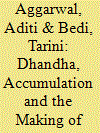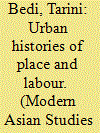| Srl | Item |
| 1 |
ID:
188188


|
|
|
|
|
| Summary/Abstract |
In this paper, our main objective is to pay attention to social and material accumulations in a form of self-employed work practised by non-elites in the Indian city of Mumbai, which they call dhandha. Using ethnographic examples of two working-class, urban dhandhas—taxi-driving and vending—we suggest that thinking with the concept of dhandha and other conceptions of value and relationality that people associate with this kind of work helps us rethink and open up more abstract and universal conceptualisations of accumulation. We examine not just how much accumulation occurs but also who the various actors are in making accumulation possible; what gets accumulated and how; and why even burdensome accumulations are considered valuable and are intentionally pursued and embraced. As ethnographers who conducted our work in several of Mumbai’s many languages, we pay attention to the specific words and concepts used by our interlocutors to describe their work and their economic relations and argue that dhandha in Mumbai is not just work, it is also a way of making valuable lives and navigating the world.
|
|
|
|
|
|
|
|
|
|
|
|
|
|
|
|
| 2 |
ID:
161697


|
|
|
|
|
| Summary/Abstract |
When it comes to historical and ethnographic accounts of transport labour outside the West, scholars have only recently intervened to correct the paucity of systematic scholarship in this area. This article is in conversation with scholarship in both labour history and urban anthropology through which it links the modern history of a particular mode of urban transport (the taxi) and the labouring history of those who drive, move, and fix it. Through a focus on a community of hereditary taxi drivers known as chillia in the Indian city of Bombay/Mumbai, this article expands our understanding of labour experiences of the city through the twentieth century and into the present. It moves between historical archives, oral history, and lived experience to illuminate how the labour of transport workers structures circulations, collective identities, and urban space. It explores several dimensions of the history and present of transport labour in India. First, it is concerned with the connection between the work of hereditary motoring and the reconfiguration and constitution of communal identities in contexts of urban labour migration. Second, it is interested how labour practices become embedded in broader social and cultural space. Third, given that chillia have continued in the trade for over 100 years, the article explores the circuits of work and labour surrounding their trade to illuminate intersections between political and cultural shifts in Mumbai, changing conditions of work in contemporary contexts of globalizing capital, and the forms of ‘non-consent’ that emerge out of these networks.
|
|
|
|
|
|
|
|
|
|
|
|
|
|
|
|